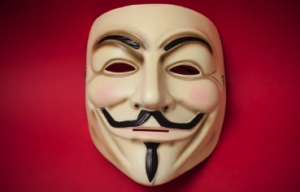In the digital age, the term “Anonymous” has become synonymous with a loosely organized group of activists and hackers who have made headlines for their high-profile cyber-attacks and social justice campaigns. Yet, the origins of Anonymous are shrouded in mystery, and understanding why this digital movement was founded requires delving into the annals of internet history.

Anonymous is not a traditional organization with a clear chain of command or a central leadership structure. Instead, it’s a collective of individuals who come together, often anonymously, to advocate for various causes, ranging from freedom of speech to social justice. To grasp why Anonymous was founded, we must explore its roots and the events that led to its formation.
1. Birth on the Imageboard 4chan
Anonymous first emerged from the depths of the internet on the imageboard 4chan, particularly its /b/ board. Imageboards like 4chan allowed users to post images and comments anonymously, which set the stage for the development of Anonymous. It’s crucial to understand that 4chan has no central agenda, and its user base is diverse, consisting of pranksters, trolls, and activists.
During the mid-2000s, 4chan’s users started engaging in “raids,” where they collectively targeted websites and online communities for various reasons, often just for fun. However, these raids paved the way for a more significant and politically motivated evolution of the Anonymous movement.
2. Operation Chanology: A Turning Point
In 2008, Anonymous gained significant attention through “Operation Chanology.” This operation was launched in response to the Church of Scientology’s attempt to suppress a leaked video of Tom Cruise discussing the church’s beliefs. Anonymous viewed this as an attack on freedom of speech and took up the cause.
Anonymous members organized protests outside Scientology churches, utilized DDoS (Distributed Denial of Service) attacks to disrupt Scientology websites, and published documents critical of the Church. It marked the first time Anonymous mobilized in a focused and politically charged manner, signaling a shift from mere internet trolling to social and political activism.
3. Advocacy for Freedom of Speech
One of the central themes behind the founding of Anonymous was a commitment to protecting and promoting freedom of speech on the internet. Anonymous viewed itself as a force against internet censorship, governmental overreach, and corporate control over online platforms.
In various operations and campaigns, Anonymous has defended individuals and organizations facing censorship or persecution. For instance, they have targeted websites or services that have been accused of infringing on freedom of speech. Anonymous members often argue that a free and open internet is essential for the exchange of ideas and the protection of individual rights.
4. Fight Against Injustice
The quest for justice has been another driving force behind Anonymous’s actions. The movement has actively involved itself in cases of social injustice, such as the Occupy Wall Street movement and the protests in Ferguson following the shooting of Michael Brown.
Anonymous often uses its hacking skills to reveal information related to corruption, police brutality, or other issues. Their actions, while controversial and sometimes illegal, are driven by the belief that they are exposing wrongdoing and seeking justice on behalf of marginalized or oppressed groups.
5. Diverse Causes and Actions
Over the years, Anonymous has participated in a multitude of actions, both online and offline, driven by various causes. They have targeted terrorist organizations, worked to expose child pornography rings, and supported activists in authoritarian regimes. Their motivations have ranged from the protection of wildlife to taking on oppressive governments, reflecting a diverse and adaptable nature.
6. The Power of Anonymity
The name “Anonymous” is fitting, as it encapsulates the movement’s core principle of anonymity. Individuals participating in Anonymous actions often hide behind pseudonyms and masks, allowing them to avoid personal consequences while making collective statements or taking action. This anonymity has enabled individuals to join forces in a way that minimizes personal risk and maximizes the impact of their actions.
7. Ethical Dilemmas and Legal Consequences
It’s important to note that Anonymous’s methods are often controversial. DDoS attacks, hacking, and doxing (revealing personal information) are not universally accepted as ethical means of pursuing social justice. While some view these actions as necessary to reveal wrongdoing, others see them as cybercrimes that should be prosecuted.
The lack of a formal structure or code of conduct within Anonymous means that individuals’ actions may not always align with the movement’s original ideals. This has led to internal conflicts and debates within the Anonymous community.
Conclusion
The birth and evolution of Anonymous are deeply rooted in the ever-changing landscape of the internet and the desire of individuals to band together in pursuit of various causes. Anonymous, as a digital movement, remains a powerful and enigmatic force, its origins reflecting the unpredictable and dynamic nature of the digital age. While their methods may be contentious, Anonymous continues to inspire debate and discussion about the limits of online activism and the importance of safeguarding freedom of speech in the digital world.